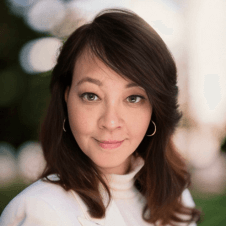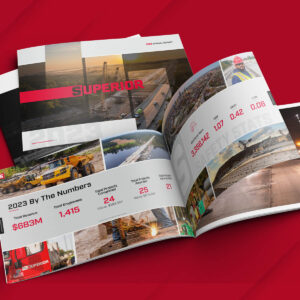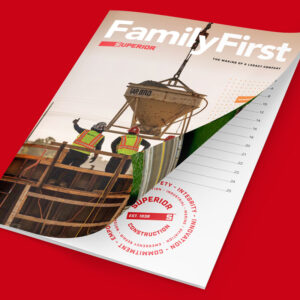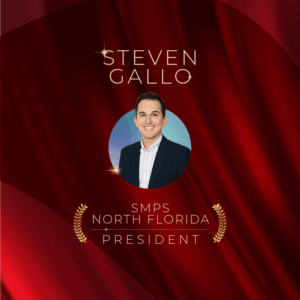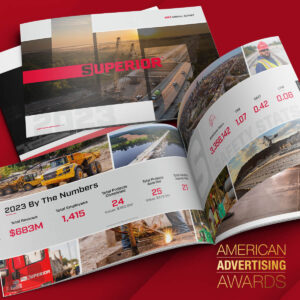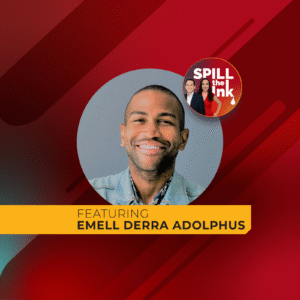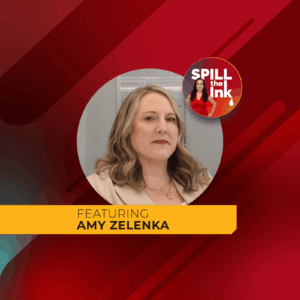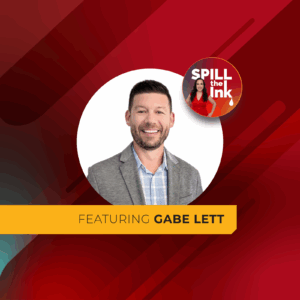
Spill the Ink: The Reputation Ink Podcast
Challenging AEC’s Myth That “Anyone Can Do Marketing”
The misconception that “anyone can do marketing” creates barriers that relegate AEC marketers to tactical roles rather than strategic business partners. In this “Spill the Ink” episode, Michelle Galindez, Director of Marketing and Communications at Syska Hennessy Group, discusses practical strategies for marketing leaders to find their voice, challenge assumptions and demonstrate value in terms that resonate with technical executives.
Michelle has spent nearly a decade reinforcing Syska Hennessy’s global marketing function into a trusted strategic business driver. She covers actionable tips to help marketers build technical fluency and gain the confidence to reshape conversations with seasoned technical experts, such as prioritizing hands-on learning through site visits, attending technical training alongside firm engineers and systematic relationship-building with internal champions who understand marketing’s strategic value. Michelle also shares examples of the advice in practice at Syska Hennessy.
Here’s a glimpse of what you’ll learn
- How to overcome the misconception that “anyone can do marketing” in AEC firms.
- Strategies for learning the technical aspects of an AEC firm without becoming an engineer.
- Practical approaches to finding your voice in rooms full of technical experts.
- How to challenge assumptions and ask strategic questions that drive results.
- Methods for demonstrating marketing ROI and tying efforts to firm goals.
- The importance of starting small and building a team of marketing champions.
- How to transition from order-taker to strategic partner.
About our featured guest
Michelle Galindez joined Syska Hennessy Group in 2017 to refine, realign and evolve the firm’s marketing and communications strategy to establish a best-in-class, in-house marketing agency. This agency supports the firm’s technical expertise and thought leaders while serving as a backbone for business development and client care.
Previously, she served as the national marketing and communications lead for a global management and consulting firm for engineering services, where she developed and enhanced the brand by creating and implementing successful marketing, staffing, branding, communications and public relations campaigns. In 2016, she was featured in Hispanic Executive for her role in rebranding. She has served as past president of the Society for Marketing Professional Services (SMPS) and is part of the group’s mentorship program.
Based in New York, Michelle’s areas of expertise include branding, staff development, strategic marketing, communications, public relations, graphics analytics and client care. She holds a bachelor’s degree in business management with a concentration in marketing and psychology from City University of New York and attended Shillington College for Graphic Design. She is also a LEED Accredited Professional.
Throughout her career, Michelle has successfully navigated the challenge of establishing marketing credibility in technically dominated environments. She’s known for her hands-on approach to learning technical aspects, from riding construction elevators in buildings without walls to taking technical training courses alongside engineers. Her collaborative approach has led to innovative successes, including the development of a top-performing app through strategic marketing and technical team partnerships.
A born-and-bred New Yorker, Michelle is a passionate Yankees fan. When she’s not› at a game, you can find her baking and decorating cakes for family and friends.
Resources mentioned in this episode
- Check out Syska Hennessy Group
- Follow Syska Hennessy Group on LinkedIn, Instagram and X
- Connect with Michelle Galindez on LinkedIn
- Say hello to Michelle Calcote King on LinkedIn
Sponsor for this episode
This episode is brought to you by Reputation Ink.
Founded by Michelle Calcote King, Reputation Ink is a marketing and public relations agency that serves B2B professional services firms of all shapes and sizes across the United States, including corporate law firms and architecture, engineering and construction (AEC) firms.
Reputation Ink understands how sophisticated corporate buyers find and select professional services firms. For more than a decade, they have helped firms grow through thought leadership-fueled strategies, including public relations, content marketing, video marketing, social media, podcasting, marketing strategy services, creative services and more. To learn more, visit www.rep-ink.com or email them at [email protected] today.
Transcript
Disclaimer: What you’re reading is an AI-transcribed version of our podcast. It may contain mistakes, including spelling and grammar errors.
[00:00:00] Michelle Galindez: Don’t just come there as support. Come there as the expert and give some insights on what you’re seeing, or even challenge the assumption of what’s being said.
[00:00:16] Announcer: Welcome to Spill the Ink, a podcast by Reputation Ink, where we feature experts in growth and brand visibility for law firms and architecture engineering and construction firms. Now, let’s get started with the show.
[00:00:33] Michelle Calcote King: Hi everyone. I’m Michelle Calcote King. I’m your host, and I’m the principal and president of Reputation Ink. We’re a public relations and thought leadership marketing agency for B2B professional services firms, including architecture, engineering, and construction firms. To learn more, go to www.rep-ink.com.
I’m thrilled to be joined today by Michelle Galindez, who brings over two decades of expertise marketing architecture, engineering, and construction firms. She serves as the Director of Marketing and Communications at Syska Hennessy Group, an engineering firm specializing in mechanical, electrical, and plumbing services.
Michelle’s described an interesting challenge that we’re going to talk about today in the industry that we’re going to explore, which is this misconception really anyone can do marketing and how it creates obstacles for marketing professionals trying to establish their expertise in technically dominated fields.
We’re going to dig into that. But first, let’s welcome Michelle.
Michelle, I’d love for you to tell us a little bit more about your background and how you got into AEC.
[00:01:39] Michelle Galindez: Sure. Thank you. Again, my name is Michelle Galindez. I’m the Director of Marketing Communications at Syska Hennessy, and I have been at the firm for just about seven and a half years and really run the function of all of our marketing strategies, our communication strategies, and even have delved into product marketing with our team here.
We are a global firm and we have 20 offices in the U.S. and two internationally, and we’re about to open a third one, which is pretty exciting.
[00:02:10] Michelle Calcote King: That is exciting. Let’s talk about this misconception that anyone can do marketing because there is this low barrier to entry. We don’t have a certification. Let’s talk about how it can impact our work and the effectiveness and the morale of the firm’s marketers. Tell me a little bit about that.
[00:02:32] Michelle Galindez: Sure. There’s this misconception that anyone can do marketing, and I think what we experience in AEC marketing is that a lot of people work on strictly proposals and they do a lot of proposal style styling, and they call that marketing.
But the same employees, these same professionals are expected to also think about things like website design or rolling out a new service or helping to open up a new office. At times there is this misconception that the marketer in house is not the expert, that we have to rely on the technical expert, not only for the engineering, but also for the idea of how to open this office, how to sell this project.
What we find is sometimes that the voice is limited. You don’t get enough of a chance to speak up and be a strategic partner.
[00:03:25] Michelle Calcote King: I agree. I see that challenge so much with our clients. Tell me a little bit about how you’ve navigated that throughout your career because obviously you’ve had a very successful career. You’ve been in this industry for many years. How have you navigated it and worked around that?
[00:03:45] Michelle Galindez: When I first started in the industry, truth be told, I did not know anything about mechanical, electrical, plumbing engineering, and I had technical people tell me that.
One of the things that I found really helpful was to get on site. I worked with our employees at the firm at the time that I was at and was able to look inside of a building behind the walls and see what a chiller looked like and look at a generator for the first time and ride in a scary construction elevator when the building didn’t have walls yet.
I was also really guided by some principals who thought it was important to be around their junior engineers and learn the lingo. Very early in my career, I took a train class and I remember everyone in the class was mechanical and I was sitting there and they were like, why are you here?
I was like they want me to learn this product. It’s a technical product, which for most, even if you go to school for marketing or you don’t, you really don’t have exposure to technical products the way you do some other industries. The only way to really understand it is to get yourself out there.
[00:05:00] Michelle Calcote King: It’s an interesting field in that when you are a marketer of any service or product, you have to become an expert at that service or product that you are marketing. So you have to be both an expert at marketing, but then you also have to be an expert at what you are marketing, you have to really understand it deeply.
Not to the level of the experts that you are the subject matter experts, but you really have to understand it at a depth that is substantial enough to talk about it and to understand it, to be able to market it effectively. I know that you also talked about finding a voice in the room.
Part of our job as marketers is to work internally and to have a voice internally and to navigate those conversations with those internal subject matter experts. Tell me a little bit about how you have done that in practice and how you’ve kind of found your voice with those technical experts.
[00:06:09] Michelle Galindez: It’s a really great question again, and I think that for marketers to find their voice in the room, it means kind of showing up as the expert. I really liked when you said we have to understand a technical piece of it, but we don’t have to be the engineer or the architect, or whatever you are.
But I think the idea of showing up and finding your voice means don’t just come there as support. Come there as the expert and give some insights on what you’re seeing, or even challenge the assumption of what’s being said. You may have a principal who’s been there for 20 years and says, let’s do it this way, and just offer up a small idea and say, I hear what you’re saying, but what if we consider A, B, and C.
So, challenge some of the assumptions around the messaging. Ask a question like, what does success look like to the client? So that’s a big piece because instead of saying, hey, what do you want me to write, you become reactive and supportive if you say, what would success look like?
And they say, you know what, it’s aviation client. They’re really thinking about budget. They’re really thinking about trying to get this done on time, ahead of schedule. So if we can key in on those two things, and you can take that and run with it, you are not just sitting there going, okay, let me listen to him or her and write this up.
You’re saying, okay, now I’m going to really pitch this and message this in a way that sets my firm apart from others.
[00:07:44] Michelle Calcote King: I love that you talked about that question that you just asked, because that’s a question I often ask clients when, if you hire us in a year’s time, what will success look like to you?
Because knowing the right questions to ask is a skillset. Is part of the strategy piece, is how to navigate those questions and is part of that ability to get the right information out of the people that you’re working with. So that’s a really critical piece of advice.
So that was a great example. I’d love if you have other examples of where you’ve kind of successfully up managed, maybe a process with a technical staff that maybe led to a better marketing outcome, you know, that kind of helps with collaboration, that kind of thing.
[00:08:41] Michelle Galindez: We had one recently here at Syska that I think is a good one, and it’s probably one that maybe marketers will start seeing more of the future.
Our company developed an app recently, which that’s not a proposal and that’s unlike anything that a lot of firms do naturally. And what we started offering to our innovation manager was the idea of wire frames matter, how your eye moves, matters color theory when it comes to tech products.
It’s not just going to be the corporate colors. So we ended up really working hand in hand with our innovation manager to basically redo all the wire frames for this app that was in development. And I think the end product was a real successful product. Very interestingly enough, the app was free on the app store right now.
It did take a village to put it together. We got really smart engineers who helped to do the calculations. We had some junior engineers who are really interested in Python and programming, and they helped. But I think the idea that this innovation manager had enough of a sense to think about marketing.
As in other industries, you don’t put those sneakers on a shelf unless the marketers are like, yeah, this is good to go. And so we kind of treated it the same here. And it worked out really well in the end.
[00:10:17] Michelle Calcote King: Love that. So you showed them that marketing is also a science. Marketing can be a science, just like engineering can be a science.
And I love that because it absolutely can be. There’s absolutely a science. Marketing is an art in many ways, but there’s definitely a science that goes behind that. And I love to do that too. I love to show technical people that there’s a lot of studies behind what we do. There’s research behind what we do.
And that’s definitely a way to kind of up manage, to show them, hey, there’s expertise behind this. I think a lot of engineers aren’t aware of. They think you’re kind of the person that makes things pretty.
[00:11:05] Michelle Galindez: Well, I mean, we’ve heard that before. I think every marketer will make it look pretty. But I think what you just keyed in on is that their psychology behind why people buy things or why things resonate. And I think that was sort of like what we were given the ability to finally do and say, hey, if we design it one way it looks like this.
If we design it another way, it could do that. And it’s just a little bit of a game changer. Don’t get me wrong. There’s still some engineers who go, they made it look pretty and it’s cringey. But again, our lead at the company really got it. And I think that’s what we need to do.
I think you gotta champion one by one. Show up. Champion one by one. Try again if it doesn’t work. We know that everything doesn’t always go as planned, but if it does, set the precedent that that’s your model to keep working on.
[00:11:57] Michelle Calcote King: It’s like software development. You kind of have to iterate. You have to roll it out, test it.
So, and kind of as looking at the kind of evolution of AEC marketing, how are you seeing the relationship between marketing and technical teams transform now? Are you seeing a difference from when you first entered the field?
Are there any positive shifts happening or is it the same or is it different or is there anything that, like if you’re if someone new is entering the field because I know I often talk to my team and I kind of say, oh, back in the day, are there differences that are encouraging?
[00:12:46] Michelle Galindez: I think there’s some differences that are encouraging. I do think that we’re in a little bit of a better space. I think architects are probably a little bit more ahead of than the engineers and contractors too, where people are starting to understand that marketing isn’t just proposals anymore.
That it’s this whole field where it’s responsible for so many different things. We’re talking about not just proposals, but we’re talking about websites and social media campaigns and like I just mentioned, products and award submissions. And the list goes on and on. I think there was a time where marketing was seen because it has its administrative piece as way too administrative.
And I think we’ve turned the tide a little bit. I don’t think every firm is quite there yet, but I think, again, when we talked about up managing and trying to show the work through execution. Just understanding the product. I’m not, I never have pretended to be an engineer, but it is my responsibility to understand what a underfloor air system is because then I can market that better.
And so I think understanding that audience, understanding the terms that are in the firm and then asking interesting questions, finding your champions. There are technical folks who are more marketing minded than others. Align with those people.
If I have to give one word of advice, do that. I still think about one principle early in my career, because he was the one who was like, we’re taking you on site. You need to go to the training class. You need to learn what it is to understand what engineer does, to do marketing.
And I think we’re talking about probably 2005 at this point. So 20 years later, I still think about him and go, wow, he had such an impact because he had the marketing mind and he understood that we’re not just sitting here waiting for an RFP and waiting to put your next firm profile and resume together that there’s a different mission for marketing.
[00:14:53] Michelle Calcote King: I could not agree with that more. The people that really get it. And then when you make inroads with those folks, the others see the success that you have with them and then you are able to get them on board because they go, oh, I see what they’re doing over there.
I want some of that. I wholly agree. I call it the coalition of the willing. That’s a great name. Yeah, because it’s very hard. It’s very conservative industry. They don’t want to be the first to try something. They didn’t go into this field to be groundbreaking and progressive, they went into it because their personality types aren’t to be creative and different, so it’s not their comfort zone.
So if you find someone that likes that and you can try some things with them, then that is absolutely a great strategy.
So what advice would you give to someone, a marketing director who’s trying to shift their firm’s perception of marketing from a support function? And I see this often, they’re more of a support, they’re order takers. And they’re not really at the table making decisions.
And they’re not that strategic partner, so they want to become more of a strategic partner. How would you guide them to become more of a strategic partner?
[00:16:32] Michelle Galindez: One of the things I did here at Syska was, we tried to form more of an agency model, which you see in what you’re probably doing.
Which is not just a team of proposal stylists, but there’s different folks doing different things. Someone who’s working on the social media, someone who’s working on videography and editing, someone who is a proposal coordinator. So I think, what advice would I give as a marketing director in trying to shift that firm perception?
Strategic thinking. Tie what you are doing in your marketing business plan, your communication business plan, back to the firm goals. We gotta secure clients, client retention, market expansion, we’re doing really well doing X, Y, Z. Let’s move that somewhere else. Profitability. I don’t think AEC marketers get enough credit for the ROI of their work awards.
Have ROI, whether you know that or not. Website has an ROI. All too often we don’t talk about the values of these things and how they impact firms. And so I think it’s sort of missed. And I think, again, when you speak the language of your technical leaders and you frame marketing not as this cost center, but as this investment piece to help your firm’s ultimate growth, I think that’s when you start changing the game and the dialogue.
Of what you are doing. It’s not, like you said, reactive and just taking orders. When is the next RFP? Let me work on it. Celebrate those wins visibly in front of people. If your campaign really resonates and helps to bring a RFP or bring on a new employee, again, these are things that we don’t necessarily get credit for the ROI, but they are absolutely happening every day in AEC.
[00:18:27] Michelle Calcote King: I love that. Speak the language that they’re speaking. And tie what you’re doing to their goals. So if they want to grow in a market, how can what you do help them achieve their goals? That is excellent advice. I love that you’re talking about awards because that’s a key service of ours.
And I’m a big believer in that. And tying those directly to that. That’s excellent advice. Well, we always love ending these interviews with allowing you to give sort of one final thought or one important lesson for our listeners. So if you had one that you’d like to give, I’d like to let you give that.
[00:19:17] Michelle Galindez: I think you should start small. Don’t take on more than you can. I think a lot of firms have a lot of initiatives happening at the same time, and I think the priorities can be overwhelming to marketers at time. And I think the best way to do it again, is really start small.
Really key on, key in, on something you know you can bring back to the firm and make it work. And again, tie it back to the firm’s mission, their vision, their goals, their business strategy. I don’t think we do that enough. Like sit there and go okay. What is the organizational plan? And what is the business plan? That’s how the marketing plan comes to be.
It can’t just be like, hey, you have X amount and make do. So I think if I had to do it all again, I would learn the product as early as I can, but I would also really just start speaking the language and really tying in what we do day in and day out to the ultimate strategy of the firm.
[00:20:19] Michelle Calcote King: I love that. You’d be amazed how many organizations don’t have a strategy. So I have asked clients, has your leadership given you a strategy? And they say, well, no, I don’t think they have one. So that’s step one is work for an organization that does a strategic plan every year.
Get that strategic plan, work for an organization that does strategic planning every year, shares it with your marketing team, and then you can ladder up what you’re doing to support that strategic plan. Because ultimately that’s what we’re doing is we’re helping our companies grow and make money.
Otherwise we’re not adding value. Well thank you very much. This has been an excellent conversation. Thank you so much for talking to us. We’ve been speaking to Michelle with Syska.
[00:21:16] Michelle Galindez: Thank you so much. I appreciate it.
[00:21:21] Announcer: Thanks for listening to Spill the Ink, a podcast by Reputation Ink. We’ll see you again next time and be sure to click subscribe to get future episodes.
Related AEC and Engineering. Content
Maximizing Employee Engagement Through a Compelling Employee Newsletter
Reputation Ink | Jun. 24, 2025
Rebuilding a Construction Company’s Brand With Impactful Visuals
Reputation Ink | Jun. 24, 2025
Join the INKsights Email List
Get Exclusive Updates on Awards, Lists, Rankings, Editorial Opps and More.
Subscribe to our newsletter, INKsights, to receive insights (pun intended) on thought leadership, public relations, and marketing for B2B professional services firms sent straight to your inbox.
Available only to our email subscribers:
Once a month, you’ll receive the latest awards, rankings, lists and editorial opportunities in the legal or AEC industry (you choose which you’d like to receive).
In the off weeks, we send you our latest thinking on the marketing and PR issues facing those industries. You can opt out anytime (although we’ll bet our favorite coffee mug you’ll never want to leave).
